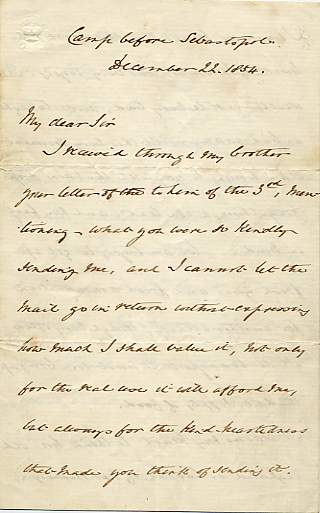

|

PEEL, Sir William (1824-1858). Naval officer, son of Sir Robert Peel, Victoria Cross holder. Autograph Letter Signed to Edmund Grundy of The Wylde, Bury [Lancashire], 4 pages 8vo (some soiling to the last page), Camp before Sebastopol [sic], 22 December 1854. Thanking him for a gift, the news of which he had received through his brother; expressing the hope that the worst [of the siege] was over, November having been 'very trying'; commenting on the appalling weather; and giving his views on the conduct of the campaign, and in particular the resources of Sevastapol and of the strengths of the Russian artillery. '... I trust we have seen the worst, the month of November was very trying. ... At this very moment I am writing to you with the rain beating through the tent, and my feet in mud. We are trying to get up fresh guns and fresh ammunition for another attack, though very often all our transport cannot even bring up the daily supply of food. ... It was not until after five further attempts on the capital that Sevastapol fell in September 1855. Peel (who was to be created KCB in 1858) had sailed to the Crimea in the Diamond and had landed with the naval brigade assisting in the siege, under the command of Captain Stephen Lushington. In October 1854 he had thrown a live shell, the fuse still burning, over the parapet of his battery. It was he who would carry the first ladder in the assault on the Redan in 1855. When the Victoria Cross was introduced in 1856, specifically for acts of valour in the Crimea, he became one of the first to receive it. That William Peel is so little known to history despite his achievements and his undoubted courage is in large part due to his tragically early death, from smallpox contracted in India, where he had displayed yet more valour. [No: 25744] The image is of th first page only.
| |